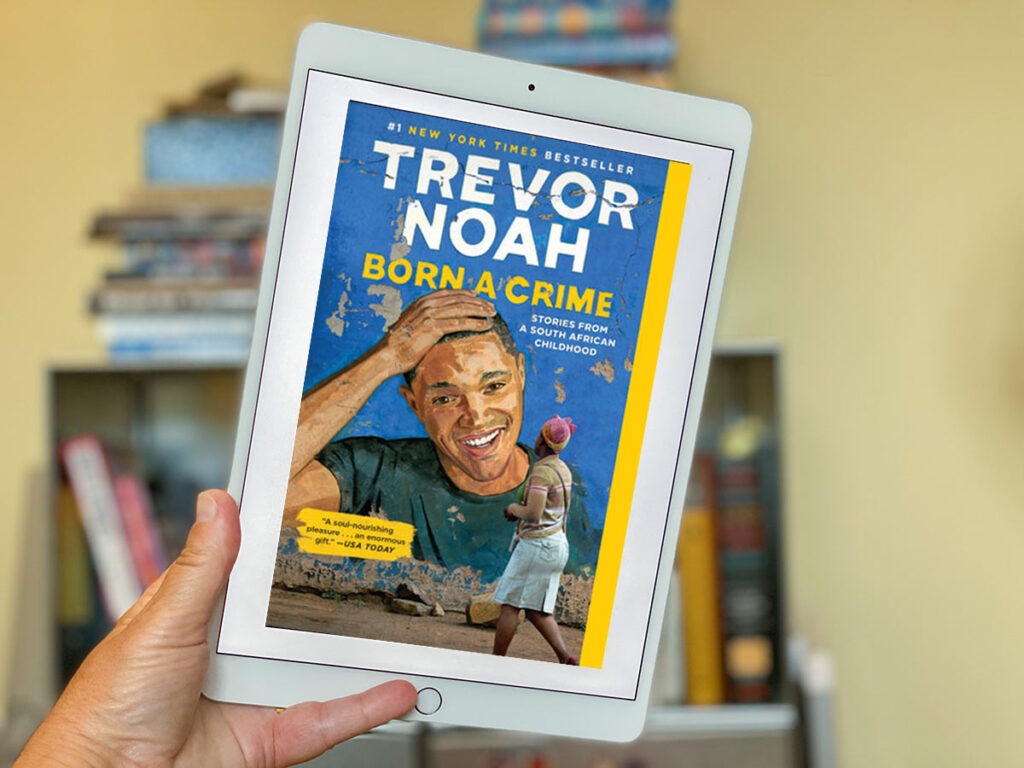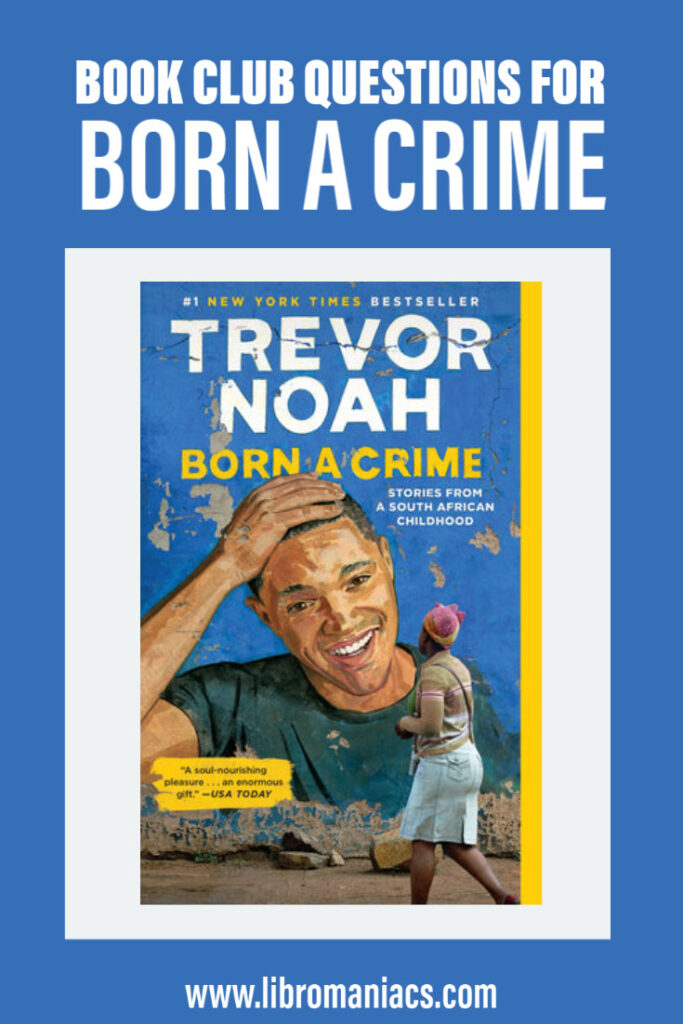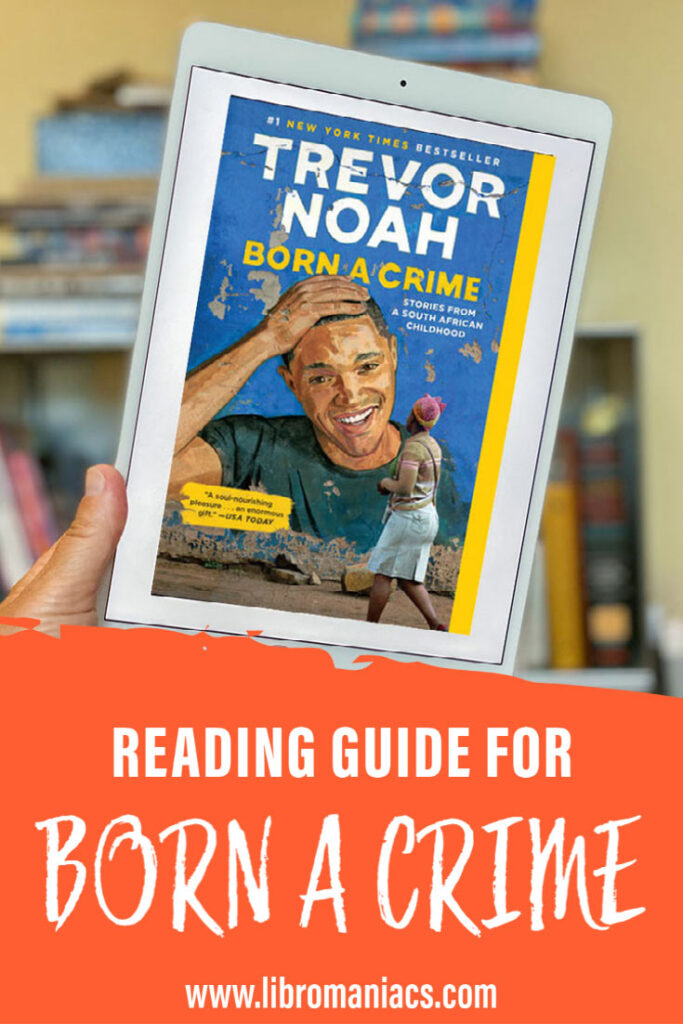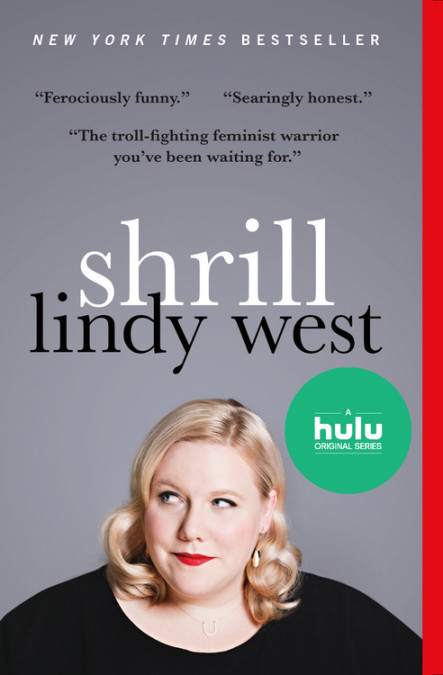Born a Crime is a remarkable memoir. Many celebrity memoirs simply offer a voyeur’s view into the life of someone whose work that we admire. And Born a Crime has that, but it’s also an education on how the warped Apartheid policies impacted day-to-day life for Black and Colored South Africans. And Noah’s experiences offer insight into the complexities of class and race which are disturbingly applicable elsewhere in English-speaking world.
There is a lot to talk about here and these Born a Crime book club questions will help you get the conversation started.
Start your book club discussion by looking at the publisher synopsis below. Does it accurately reflect your experience of the book. If not, how might you rewrite it?
Then take a look at our 10 Born a Crime book club questions, and read the selected reviews to jump start your discussion.
If you liked the book, we’ve also suggested three more books like Born a Crime to add to your TBR pile.

(This article contains affiliate links. This means that if you choose to purchase, I’ll make a small commission.)
Born a Crime Synopsis
(We always chose to provide the publisher synopsis because we feel that it’s worthwhile to discuss whether the official book description actually squared with your experience of the book.)
Born a Crime: Stories from a South African Childhood, by Trevor Noah
Trevor Noah’s unlikely path from apartheid South Africa to the desk of The Daily Show began with a criminal act: his birth. Trevor was born to a white Swiss father and a black Xhosa mother at a time when such a union was punishable by five years in prison. Living proof of his parents’ indiscretion, Trevor was kept mostly indoors for the earliest years of his life, bound by the extreme and often absurd measures his mother took to hide him from a government that could, at any moment, steal him away.
Finally liberated by the end of South Africa’s tyrannical white rule, Trevor and his mother set forth on a grand adventure, living openly and freely and embracing the opportunities won by a centuries-long struggle.
Born a Crime is the story of a mischievous young boy who grows into a restless young man as he struggles to find himself in a world where he was never supposed to exist. It is also the story of that young man’s relationship with his fearless, rebellious, and fervently religious mother—his teammate, a woman determined to save her son from the cycle of poverty, violence, and abuse that would ultimately threaten her own life.
The stories collected here are by turns hilarious, dramatic, and deeply affecting. Whether subsisting on caterpillars for dinner during hard times, being thrown from a moving car during an attempted kidnapping, or just trying to survive the life-and-death pitfalls of dating in high school, Trevor illuminates his curious world with an incisive wit and unflinching honesty.
His stories weave together to form a moving and searingly funny portrait of a boy making his way through a damaged world in a dangerous time, armed only with a keen sense of humor and a mother’s unconventional, unconditional love.
Born a Crime Book Club Questions
These questions have been tailored to this book’s specific reading experience, but if you want more ideas, we also have an article with 101 generic book club questions.
- Noah reads his own audio book, creating a series of voices for his family members and friends. Did you listen on audio? If so, how did his characterizations affect your reading experience?
- Noah describes his mom as a problem child. As a young woman, Patricia consistently bucked the culture (and the law) by doing things like going to typing school, living in downtown Johannesburg and having a baby with a White man. She seems to embody what was a transitional time for South Africa. Discuss the risks and benefits of the choices that Patricia made in her younger years.
- Patricia told Noah that, “If I leave him Trevor, he will kill us”. And indeed, his stepfather attempted to do just that. Discuss his Abel’s particular brand of toxic masculinity and his impact on Noah’s upbringing.
- Noah’s father Robert told him that, “Relationships are built in the silences. You spend time with people, you observe them and interact with them, and you come to know them—and that is what apartheid stole from us: time.”. Indeed, Noah had very little time with his father. What did you make of their relationship? Why do you suppose that Robert was so reluctant to share his own personal stories with Noah?
- Noah’s brother Andrew makes a brief appearance at the beginning of the book and then both Andrew and the youngest brother Isaac re-appear in the final chapter. But there was nary a word of them throughout most of the book. Why do you think that they were so absent from the narrative?
- When Noah was on the hustle, he thought he was killing it. But after the loss of his music hard drive and his arrest for “borrowing” Abel’s car, Noah realizes that he’s really just treading water and that “the hood” will ultimately eat him alive. Discuss this pivotal moment of awareness and how it affected Noah’s future.
- Noah makes a disturbing observation that the early architects of Apartheid actually studied America’s own Jim Crow system for tips on how build an effective system of segregation. Were you aware of this? How did you react to that information?
- Noah lived in different neighborhoods all over Johannesburg. In the Black neighborhoods, he was considered White. In the Colored neighborhood, he was considered Black. In the White neighborhood, he was considered Colored. Discuss the ways that this color-switching affected Noah’s childhood. How did he cope? How he did he use his ambiguous ethnicity to his advantage?
- South Africa’s system of segregation was particularly effective because they were able to take advantage of a culturally splintered society. Different tribal traditions and languages already divided people, and the Apartheid laws simply shoved a deeper wedge into that divide. The system ensured that Blacks were competing against one another for resources, rather than competing with Whites. What were some of the ways that this splintered culture played out in Noah’s childhood?
- Noah often found himself at the margins of his complex, multi-ethnic society. One of his coping mechanisms was to make sure that he could communicate with anyone, in their native language. According to Noah, “Language, even more than color defines who you are to other people”. Discuss some of your favorite stories about how his language skills helped others or saved his bacon when he was in trouble.
Selected Born a Crime Reviews
(Use these selected Goodreads reviews to compare with your own experience of the book. Do you agree or disagree with the reviews?)
“This memoir is the story of a mischievous young boy who grows into a restless young man as he struggles to find himself in a world where he was never supposed to exist. It is also the story of that young man’s relationship with his fearless, rebellious, and fervently religious mother: his teammate, a woman determined to save her son from the cycle of poverty, violence, and abuse that would ultimately threaten her own life.”
“This is one of the most touching love letters to a mother I have ever read. Although this is presented as a collection of coming-of-age stories in a time where his existence was literally a crime, Trevor’s words radiate pure and unconditional love for his mom. I am beyond humbled by the lessons Trevor’s childhood taught him, his struggles, the way he see the world, how he treats others (especially women), and how his mom was there every step of the way.”
“Trevor Noah spends an entire book telling us how awful he is. Amidst the tragic conditions of Apartheid South Africa, he manages to make life even worse for everyone around him through destructive pranks, minor crime and general unruliness. Written to be funny, the humor was overshadowed by my sheer inability to relate at all to Trevor’s consistently bad and destructive decisions that he seems completely unrepentant for.”
More Books Like Born a Crime
If you like the celebrity memoir, then you should also check out our synopsis and discussion guide for Greenlights by Matthew McConoughey. If you want to learn more about how race is an artificial construct, then check out our guide for Between the World and Me, Ta-Nehisi Coates.
We also have a whole article on audiobook memoirs, featuring 20 great listens from celebrities, musicians and regular mortals.
Caste: The Origins of our Discontents, Isabel Wilkerson
If you’d like to explore more about the destructive power of racial segregation and caste systems, you should definitely check out Wilkerson’s Caste. In it, she elucidates the differences between caste, race and class. She describes and compares the caste systems of Nazi Germany, India and America’s Jim Crow.
The book takes a hard look at how the upper castes work to maintain their status, even when they don’t realize that they are doing so. And she is also unflinching about the long-term affects that a caste system can have on those in the lower strata.
If you do choose to read Caste, then check out our companion book club discussion guide.
Shrill: Notes From a Loud Woman, Lindy West
If you are looking for more memoirs by comedians, then check out Shrill by Lindy West. Like Noah, West has experienced being pushed to the margins, but not because she’s Black. Rather, West is fat. And in the bro-tastic world of comedy, a funny, fat, feminist who takes no sh**t and gives no f**ks wears a target on her back.
West discusses her relationship with her body, how she came to be in comedy, why some white men in politics are so very very dumb, and how she dealt with her Twitter trolls. Her story has also been turned into a very touching show on Hulu.
Share these Born a Crime book club discussion questions on Pinterest:




